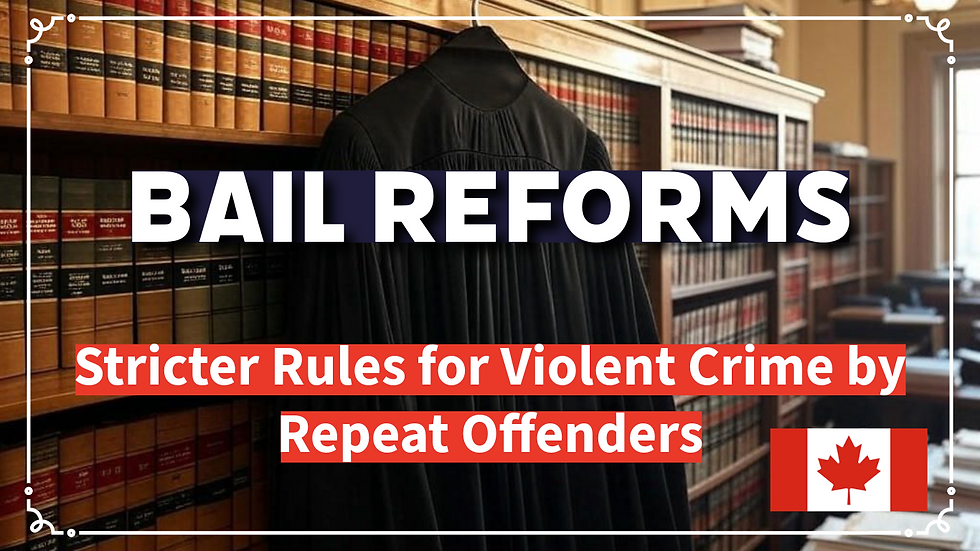Accused arrested in one case can seek anticipatory bail in another- Supreme Court
- M.R Mishra

- Sep 11, 2024
- 3 min read
The Supreme Court has ruled that an individual already in custody for one case is still eligible to seek anticipatory bail for a separate case.
The judgment, delivered by a bench led by Chief Justice DY Chandrachud and Justices JB Pardiwala and Manoj Misra, clarified that there is no legal prohibition in the Criminal Procedure Code (CrPC) that bars a person in custody for one offence from applying for anticipatory bail for a different offence.

The Court emphasized that while arrested for one case, an individual still retains the right to request anticipatory bail for another, unless otherwise restricted by specific provisions like those in the SC/ST (Prevention of Atrocities) Act.
"An accused is entitled to seek anticipatory bail for an offence as long as they have not been arrested for that specific offence," the bench stated.
"Once arrested, the only available remedy is to apply for regular bail. There is no explicit or implied restriction in the Code of Criminal Procedure (CrPC) or any other statute that prevents the Sessions Court or the High Court from considering an anticipatory bail application in connection with an offence while the applicant is in custody for a different offence"
The case of Dhanraj Aswani v. Amar S. Mulchandani & Anr. (Criminal Appeal No. 2501 of 2024) before the Supreme Court of India dealt with the issue of whether anticipatory bail can be sought by an individual already in judicial custody in connection with another case.
This issue was of general public importance, as there were conflicting judgments from various High Courts.
Background:
Respondent No. 1, Amar Mulchandani, was arrested in connection with Enforcement Case Information Report (ECIR) No. 10 of 2021. While in custody, he feared arrest in connection with a different matter (CR No. 806 of 2019), which involved allegations of criminal breach of trust, cheating, forgery, and other offenses under the Indian Penal Code (IPC).
He sought anticipatory bail in relation to CR No. 806 of 2019, and the Bombay High Court granted his application, dismissing objections from the appellant (Dhanraj Aswani) that anticipatory bail cannot be granted when a person is already in custody for another offense
Submissions:
On Behalf of the Appellant:
The appellant, represented by Senior Advocate Sidharth Luthra, argued that anticipatory bail is meant for individuals who are at liberty but apprehend arrest. He contended that a person in judicial custody cannot "apprehend" arrest, as they are already arrested.
Luthra referred to previous rulings, emphasizing that anticipatory bail is aimed at protecting personal liberty and dignity in cases where arrest is apprehended on frivolous grounds. Once arrested, however, the appropriate recourse would be regular bail.
On Behalf of the Respondent (Amar Mulchandani):
Senior Advocate Siddharth Dave argued that a person’s right to seek anticipatory bail is not eliminated simply because they are in custody for another offense. He emphasized that anticipatory bail, as per Section 438 of the Criminal Procedure Code (CrPC), is available whenever a person reasonably believes they may be arrested in connection with a different non-bailable offense, regardless of their current custodial status.
Divergent Views in Various High Courts:

The Supreme Court considered differing views among High Courts:
Rajasthan High Court (Sunil Kallani case) and Allahabad High Court (Rajesh Kumar Sharma case) held that anticipatory bail is not maintainable for a person already in custody for another offense.
Their reasoning was based on the concept that a person already under arrest cannot fear further arrest.
Bombay High Court (Alnesh Akil Somji case) and Odisha High Court (Sanjay Kumar Sarangi case), on the other hand, ruled that anticipatory bail can be sought even when the accused is in custody for a different case, arguing that each case should be treated independently.
Supreme Court’s Ruling:
The Supreme Court upheld the Bombay and Odisha High Courts’ view. It reasoned that when an individual is in custody for one offense but fears arrest in a separate case, the offenses must be treated as distinct.
Therefore, anticipatory bail is available for the subsequent offense even if the person is in judicial custody for the previous one.
The court also clarified that merely being in custody does not bar the individual from seeking anticipatory bail in relation to a different offense
Court ruled in favor of Respondent No. 1, maintaining that anticipatory bail under Section 438 of the CrPC is available to an individual already in custody for a different offense.
This decision resolved the conflict among various High Courts and reaffirmed the principle that each criminal case should be treated independently when considering anticipatory bail applications.
Case Name: DHANRAJ ASWANI Versus AMAR S. MULCHANDANI AND ANR.
DIARY NO. - 51276/2023
CA: 2501






Comments